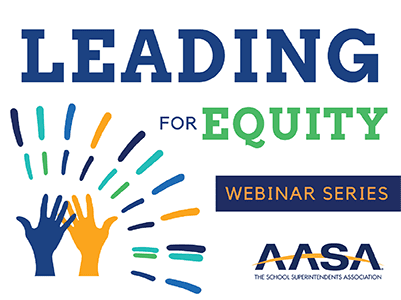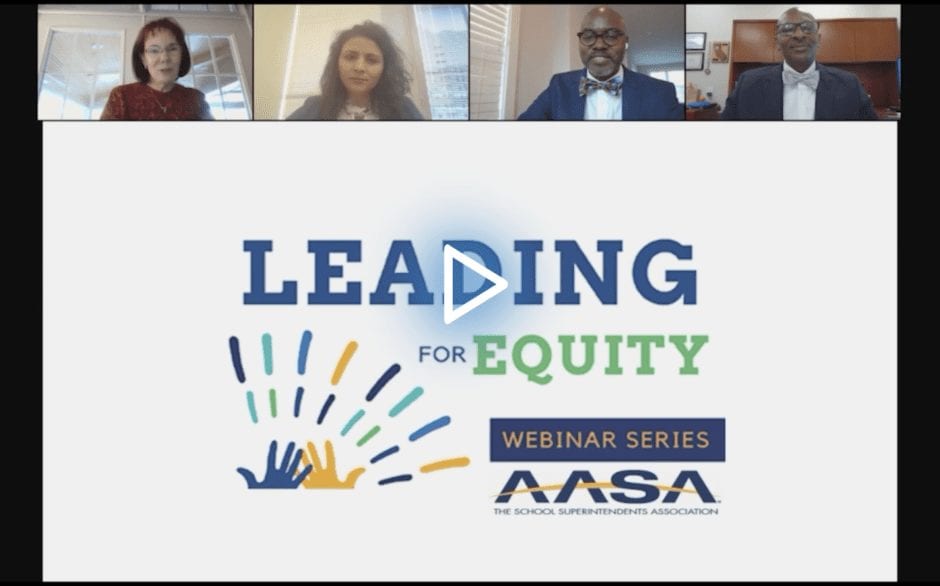Data, Policies, and Plans for the Journey to Equity
By Robert Low
Ending systemic injustices and dismantling long-standing barriers isn’t easy, and district leaders engaged in the process recently identified procedures and tools that have helped them support and guide their districts during their “equity journeys.”
During an edWebinar hosted by AASA, The School Superintendents Association and AASA’s Leadership Network, Dr. Leila Nuland, Managing Director of the K-12 Research Team at Hanover Research, explained how district leaders can compile and utilize data on educational equity. Then, Dr. Daryl Camp, Superintendent of the San Lorenzo Unified School District in California, and Dr. Gregory Hutchings, Superintendent of the Alexandria City Public Schools in Virginia, discussed the priorities and processes they have established to increase equity in their districts.
Starting with the Data
Dr. Nuland began with an overview of equity studies, which have shown educational achievement is correlated with access to certified and experienced teachers, but students of color have less access to these types of teachers. Access to gifted/talented programs and advanced courses is also unevenly distributed in regard to race, and the National Assessment of Educational Progress (NAEP) scores reveal similar inequities in regard to student outcomes.
Equity audits have become an increasingly widespread tool for examining whether districts are providing a fair and equal education for all their students, and Dr. Nuland identified three guiding questions that can help district leaders provide a focus for these audits. She recommends starting with the extent of equity and inclusion in the current environment, and then identifying which policies and practices can ensure an equitable and inclusive environment throughout the district, including the administrative, finance, and human resources departments. Finally, districts can explore ways to support change at the school and classroom levels, especially in regard to curricula and instruction.
To make the process of increasing educational equity manageable, Dr. Nuland recommends viewing it as a three-year process. The first year is the “what” year in which a district diagnoses its current status and builds a framework for continuous improvement, which includes engaging stakeholders and defining equity in a local context. The second year is the “why” year, in which the district can conduct a “root cause analysis” that includes surveys, focus groups, and rubrics to develop a deeper understanding of what has been occurring and what needs to change. The third year can then be the “how” year in which the district initiates reforms, implements research-based practices, and monitors systemic changes.
Aligning Policies
Dr. Camp of the San Lorenzo Unified School District emphasized the importance of having candid conversations that lead to aligned and explicit equity policies. More than half of the students in his district are Latino, with Asian, Black and White students comprising another third in total, and he believes “racialized equity work” is essential in this context, because the racial component of equity is so important, even though it can be hard to discuss.
San Lorenzo now has a School Board Equity Policy, which Dr. Camp believes should be reviewed and confirmed every year to make sure there is continued alignment among the stakeholders. Key components of the policy include preparing all students for college, careers, and life; closing opportunity and racial achievement gaps; and using a culturally responsive pedagogy that supports academic enrichment for all students.
Equally important is an Anti-Harassment Policy that covers the treatment of employees as well as students and the district’s programs. The policies deal explicitly with subjects such as racial slurs and gestures, and how to work with reading materials that include offensive language. In these and other ways, such as a monthly Equity Leadership Team meeting, the district is striving to achieve its vision of a compassionate, collaborative and civically engaged student body that advocates for equity and social justice.
Strategic Planning
Like the San Lorenzo Unified School District, the Alexandria City Public Schools educate a diverse mixture of students, whom Dr. Hutchings characterizes as being roughly one-third Hispanic, one-third Black, and one-third White. Dr. Hutchings is himself a “proud product” of the district, having graduated from its T.C. Williams High School, the real-life basis for the movie Remember the Titans, which depicted the challenging but ultimately successful integration of the school and its football team in 1971.
Almost a half-century later, and in the aftermath of the recent presidential election and the killing of George Floyd, Dr. Hutchings continues to see race as a “root cause” of inequity that compounds related issues such as gender and disabilities. To remove remaining barriers that prevent all students from achieving their aspirations, Dr. Hutchings recommends the development of a strategic plan for achieving racial equity.
The strategic planning process can begin with the creation of a strategic planning committee that is diverse and includes all stakeholders, including different types of district employees. The committee can then use district data to illuminate inequities and inform policies, while also looking at other districts’ strategic plans. A third step is to define equity across all areas to create a shared understanding.
Dr. Hutchings also recommends the creation of a strategic planning workbook, which includes student data, audit results and other key indicators. One crucial component is a “classroom distribution analysis” that features disaggregated data and examines access to specialized programs in particular. This type of information can be eye-opening and impactful, leading to a shared mission and vision, along with a roadmap for increasing equity.
To create and implement a strategic equity plan successfully, there needs to be alignment between the central office and all schools in the district, and prioritization of issues based on key indicators. Dr. Hutchings also emphasized the voices of diverse stakeholders need to be included and respected, so “race does not determine the quality of life, opportunities, and outcomes” for any students.
This edWeb broadcast was hosted by AASA, The School Superintendents Association and AASA’s Leadership Network, providing premier professional learning for educational leaders.
About the Presenters
Dr. Leila Nuland
Dr. Leila Nuland is a research professional with 16 years of experience working with public school district leaders in an advisory capacity. She has broad experience in research design and execution, including instrument and protocol design and data collection management. Further, she has extensive training and experience with design-based research, equity audits, and staff professional development. As Managing Director of the K12 Research Team at Hanover Research, she manages a team of 40+ advisors and analysts who partner with hundreds of district leaders from across the country. She and her team have a breadth of experience designing equity audits and supporting district leaders enact reform efforts related to diversity, equity, and inclusion. Early in her career, she was a 9th grade history teacher in Meriden, CT where she piloted a Ninth Grade Academy model to support diverse learners.
Dr. Nuland earned a B.S.Ed. at Central Connecticut State University, an M.A. at Teachers College, Columbia University, and a Ph.D. in Teaching and Teacher Education in the College of Education and Human Development at George Mason University.
Dr. Daryl F. Camp
Dr. Daryl F. Camp began serving as the superintendent of the San Lorenzo Unified School District in 2019. Previously, he served for seven years as the superintendent of the Riverbank Unified School District. Prior to 2012, he served as the assistant superintendent of educational services for the Riverbank Unified School District. Under his leadership, student learning in Riverbank USD improved and opportunities for students have expanded.
Camp served on the CSBA’s Superintendents’ Advisory Council from 2013 to 2016. In 2015, he served as the president of Region 7 of the Association of California School Administrators. In 2008, he received the Valuing Diversity Award from ACSA and the following year his article Talking about Racism in Our Schools was published in ACSA’s Leadership magazine. Dr. Camp currently serves as the president of the California Association of African-American Superintendents and Administrators (CAAASA).
Camp teaches the Setting Direction module in CSBA’s Masters in Governance program. He is also a governance consultant with CSBA’s Governance Consulting Services, developing customized board development workshops for governance teams.
He earned his bachelor’s degree at Morehouse College, his master’s degree at California State University, Hayward, and his doctorate degree in educational leadership at California State University, Sacramento. Camp graduated Magna Cum Laude from Morehouse College and was inducted into the prestigious Phi Beta Kappa scholar society.
Dr. Gregory C. Hutchings
Prior to becoming a superintendent of Alexandria City Public Schools (ACPS), Dr. Gregory C. Hutchings was the director of pre-K-12 initiatives and director of middle school programs with ACPS, where he launched the candidacy phase of the International Baccalaureate (IB) programme, which has since been implemented at Jefferson-Houston PreK-8 IB School. He also worked collaboratively with the curriculum department on the implementation of the new middle school curricula in ACPS.
In 2013, he became superintendent of Shaker Heights Schools, located in a suburb of Cleveland, Ohio. Under his leadership, he collaborated with community stakeholders, administrators and teachers to close the achievement gap and ensure that students of all backgrounds had access to the resources, tools and opportunities needed to succeed. He became one of only eight superintendents in North America to lead a district offering the IB programme for all students at all grade levels, including pre-K. Dr. Hutchings also worked closely with school board members and administrators to develop and execute a strategic plan to realize the district’s goals. He served five years as a superintendent before returning to ACPS as superintendent in July 2018. In the same year, he was selected for the National Superintendent of the Year Award by the National Alliance of Black School Educators.
An experienced educator and administrator, Dr. Hutchings served as a teacher and in leadership roles at the middle and high school levels as well as in central office administrative positions. He began his teaching career in Manassas at Prince William County Public Schools and then served as an assistant middle school principal with Chesterfield County Public Schools, near Richmond. In Nashville, Tennessee, he was promoted from an assistant high school principal to middle school principal. He was named Tennessee Middle School Principal of the Year by the Tennessee Association of Middle Schools for his role in increasing student achievement and becoming the number one middle school in metropolitan Nashville based on value-added.
Dr. Hutchings holds a bachelor’s degree in interdisciplinary studies from Old Dominion University and a master’s in educational leadership from George Mason University. He earned a doctorate in educational policy, planning and leadership in 2010 from the College of William and Mary.
About the Host
Dr. Valerie Truesdale joined AASA early in 2019 as the assistant executive director responsible for guiding leadership development services and programs. With years of experience in the superintendency and roles in instructional technology, she knows that AASA’s Leadership Network can be a substantial resource for school leaders trying to keep pace with the rapidly changing delivery of K-12 education.
Join the Community
Leading for Equity is a free professional learning community on edWeb.net for school and district leaders who face many challenges leading schools and driving school improvement for all students, especially now with COVID-19.
The AASA Leadership Network drives superintendent success, innovation and growth, shaping the future of public education while preparing students for what’s next. We are the largest, most diverse network of superintendents in America. Passionate and committed, we connect educational leaders to the professional learning, leadership development, relationships and partnerships they need to ensure a long career of impact.
Robert Low has more than 30 years of educational publishing experience, ranging from editing and product management to online advertising and content development. He also works with edWeb.net to write articles on their professional learning edWebinars.






Comments are closed.